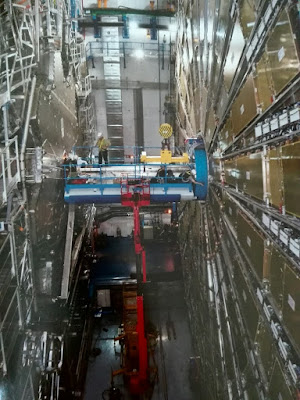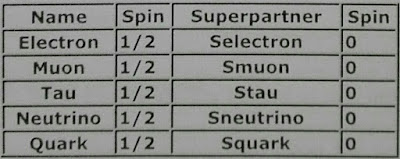Today has begun a experiment called Large Hadron Collider (LHC). This experiment is located in CERN (European Organization for Nuclear Research) and is considered the scientific experiment of this century. It has costed 3000 millions euros and, in order to build it, have taken part more than 10000 scientists . This experiment has been built in a circular tunnel 27km long in the border of France and Switzerland depths, at between 50 and 120 meters under the floor.
The LHC is really an enormous particle accelerator which constitutes the most powerful machine ever built by physicians. This accelerator will make possible collisions of high energy protons at almost the speed of light. The main goal of this high energy collisions is to discover the hypothetical Higgs boson, which is predicted by the Standard Model of elemental particles.
These are the four main experiments in the LHC:
- CMS (the Compact Muon Solenoid) and Atlas are the LHC's general purpose detectors to investigate a wide range of physics, including the search for the elusive Higgs boson (which gives other particles their mass), extra dimensions, and particles that could make up dark matter.
The LHC is really an enormous particle accelerator which constitutes the most powerful machine ever built by physicians. This accelerator will make possible collisions of high energy protons at almost the speed of light. The main goal of this high energy collisions is to discover the hypothetical Higgs boson, which is predicted by the Standard Model of elemental particles.
These are the four main experiments in the LHC:
- CMS (the Compact Muon Solenoid) and Atlas are the LHC's general purpose detectors to investigate a wide range of physics, including the search for the elusive Higgs boson (which gives other particles their mass), extra dimensions, and particles that could make up dark matter.
- The LHC Beauty (LHCb) detector is designed to answer a specific question: where did all the anti-matter go? Equal amounts of matter and its opposite counterpart anti-matter were created in the Big Bang. But today we find no evidence of, for example, anti-matter galaxies or stars. The LHCb experiment will help us to understand why we live in a Universe that appears to be composed almost entirely of matter, but no antimatter.
- ALICE While the other LHC detectors will use proton beams to do their science, Alice relies on smashing together electrically charged lead atoms. Scientists hope to re-create a state of matter called quark-gluon plasma which existed just after the Big Bang. Matter was in this "liquid" state because the early Universe was still extremely hot. The Alice detector will be used to study this quark-gluon plasma as it expands and cools. In doing so, they will observe how it progressively gives rise to the particles that make up the matter in our Universe today.
Concerning the LHC there are some scientists who are afraid the LHC could cause the end of the world. However experts deny that dangerous black holes could be generated in the LHC. The LHC, like other particle accelerators, recreates the natural phenomena of cosmic rays under controlled laboratory conditions. As this natural phenomena has been happening for millions of years and the Earth still exists, there is no reason, as I see it, to be worried about it.
Scientists hope that experiments in LHC could offer more information about:
- Higgs boson: Luckily it was discovered in 2012 and this event was the first success of LHC. However we don't know yet whether the Higgs boson is an elemental particle or it has some internal structure.
- Dark Matter: In LHC scientists are searching for heavy particles candidates for dark matter, such as WIMPs (Weak Interaction Massive Particles).
- Hierarchy Problem: Scientists will try to understand why the gravitational force is so weak or why the mass Planck is so large.
- Supersymetry: LHC could be able to discover massive superparters of the particles included in the Standard Model.
- Extra dimensions: if the massive particles predicted by some extra dimension models such as the Randall-Sundrum were detected, then extra dimensions would be confirmed.
- Microscopic Black Holes: High energy collisions could generate microscopic black holes which would evaporate almost instantly. These black holes would supply more information about Hawking radiation.
To know more:
http://news.bbc.co.uk/2/hi/science/nature/7534847.stm
http://public.web.cern.ch/public/en/LHC/LHC-en.html
http://public.web.cern.ch/public/en/LHC/Safety-en.html





No hay comentarios:
Publicar un comentario